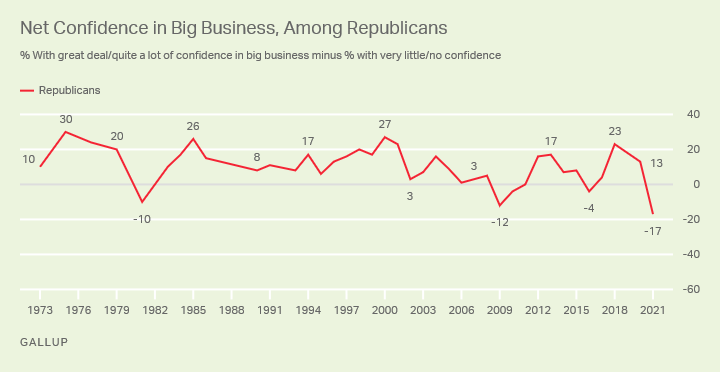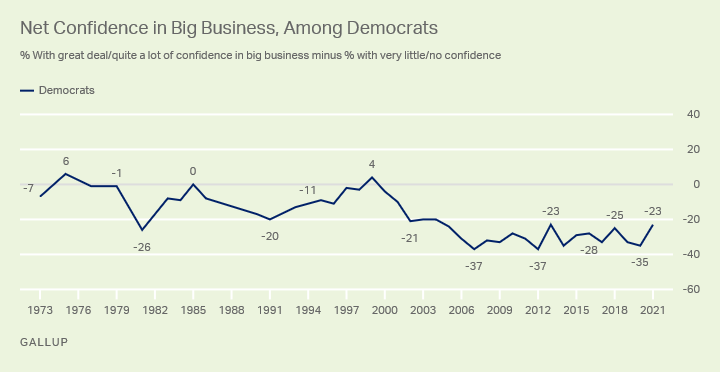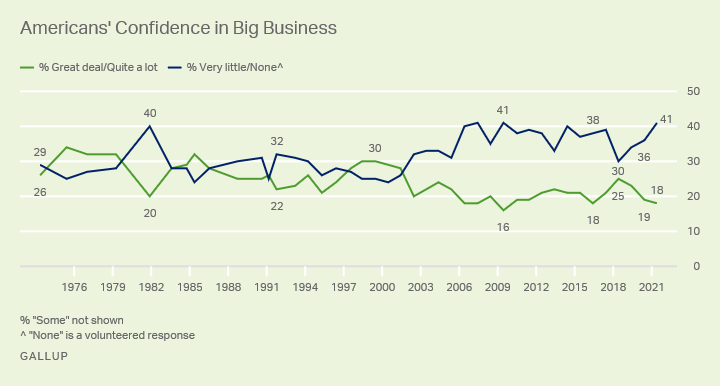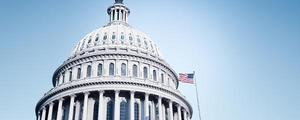Story Highlights
- Republican confidence in big business has declined sharply in past year
- Both partisan groups now view big business more negatively than positively
- GOP views of Big Tech turn negative; Democrats remain slightly positive
WASHINGTON, D.C. -- Republicans have lost significant confidence in big business and Big Tech over the past year, to the point that their generally positive view of each in 2020 has turned negative, on balance, in 2021. Specifically:
-
The percentage of Republicans expressing "a great deal" or "quite a lot" of confidence in big business declined by 12 points year-over-year to 20%.
-
Their confidence in large technology companies fell by an even larger 18 points, to 17%.
-
Also, fewer Republicans express "some" confidence in big business and large technology companies, with these ratings dropping by seven to eight points.
-
All of that decline is offset by increases in those expressing "very little" or no confidence, up 18 points for big business and 23 points for large technology.
The overall result is that Republicans' net confidence in each -- the percentage expressing high confidence minus those expressing little or no confidence -- is now significantly negative for big business (-17) as well as large technology companies (-29). One year ago, both figures were positive.
| Jun 8-Jul 24, 2020 |
Jun 1-Jul 5, 2021 |
Change | |
|---|---|---|---|
| % | % | pct. pts. | |
| Big business | |||
| Great deal/Quite a lot | 32 | 20 | -12 |
| Some | 49 | 41 | -8 |
| Very little/None (vol.) | 19 | 37 | +18 |
| Net confident | +13 | -17 | -30 |
| Large technology companies | |||
| Great deal/Quite a lot | 35 | 17 | -18 |
| Some | 42 | 35 | -7 |
| Very little/None (vol.) | 23 | 46 | +23 |
| Net confident | +12 | -29 | -41 |
| Net confident is % great deal/quite a lot of confidence minus % very little/no confidence; (vol.) = volunteered response | |||
| Gallup | |||
These findings are from Gallup's annual Confidence in Institutions poll, conducted June 1-July 5, 2021.
Democrats' net confidence in big business, although still negative on balance, has increased since Gallup's June 2020 edition of the same survey, rising from -35 to -23.
By contrast, Democrats' net confidence in large technology companies has waned, but to a much lesser degree than Republicans' -- down 10 points to +10.
| Jun 8-Jul 24, 2020 |
Jun 1-Jul 5, 2021 |
Change | |
|---|---|---|---|
| % | % | pct. pts. | |
| Big business | |||
| Great deal/Quite a lot | 13 | 16 | +3 |
| Some | 40 | 44 | +4 |
| Very little/None (vol.) | 48 | 39 | -9 |
| Net confident | -35 | -23 | +12 |
| Large technology companies | |||
| Great deal/Quite a lot | 36 | 33 | -3 |
| Some | 47 | 43 | -4 |
| Very little/None (vol.) | 16 | 23 | +7 |
| Net confident | +20 | +10 | -10 |
| Net confident is % great deal/fair amount of confidence minus % very little/no confidence; (vol.) = volunteered response | |||
| Gallup | |||
Confidence in big business and technology was fairly steady over the past year among political independents. Their confidence in big business was significantly negative both years, while their confidence in technology companies was neutral, with similar percentages expressing high and low confidence.
Republicans' Views of Big Business at Record Low
Longer term, Republicans' net confidence in big business is at an all-time low, representing one of only a handful of times it has sunk below zero on this measure.
Republicans have tended to have high confidence in big business, with an average net-confident score of +11 from 1973 to 2020. The main exceptions -- when Republican confidence in big business turned substantially negative -- occurred in 1981 and 2009. The former may have reflected public doubts about business stemming from the 1980 recession, while the dip in 2009 was likely related to the Wall Street financial crisis and associated financial and auto-industry bailouts that occurred several months earlier.

Line graph. Trend in net confidence in big business among Republicans from 1973 to 2021. Net confidence is the percentage of U.S. adults with a great deal or quite a lot of confidence minus the percentage with very little or no confidence. Republican net confidence in business has varied since 1973 from a high of +30 in 1975 to a low of -17 in 2021. It was generally higher before 2002 than it has been since then. It has been negative only five times: in 1981, 2009, 2010, 2016 and 2021.
Democrats' current -23 net-confident score for big business is typical of that party's orientation toward the institution since 2002. Their net-confident rating was less negative in most years before that, averaging -8 from 1973 to 2001.

Line graph. Trend in net confidence in big business among Democrats from 1973 to 2021. Net confidence is the percentage of U.S. adults with a great deal or quite a lot of confidence minus the percentage with very little or no confidence. Democratic net confidence in business has varied since 1973 from a high of +6 in 1975 to a low of -37 in 2007 and 2012. It was generally higher before 2002 than it has been since then. It has only been positive twice, in 1975 and 1999.
The pattern is similar for political independents. Their -24 net confidence in big business this year falls within the range of -12 to -30 recorded since 2002, but contrasts with a higher -7 score, on average, from 1973 to 2001.
U.S. Confidence in Big Business, Overall, Down Slightly
Since 1973, Gallup has asked Americans to rate their confidence in a number of societal institutions, including big business, as "a great deal," "quite a lot," "some" or "only a little." "Large technology companies" was added to the list in 2020.
This year, a combined 18% have a great deal or quite a lot of confidence in big business, which is similar to last year's 19%. At the same time, the percentage saying they have "only a little" confidence, or volunteering that they have "none," increased from 36% to 41%. Another 41% of adults, down from 45% in 2020, express "some" confidence.
Today's low-confidence percentage for big business ties the worst recorded for this institution in Gallup's 48-year trend, with the previous lows recorded in 2007 and 2009, around the time of the Great Recession.

Line graph. Americans' confidence in big business from 1973 to 2021. Graph shows two lines, one for combined great deal/quite a lot of confidence and the other for very/little no confidence. The two lines were generally close from 1973 to 2001, when nearly as many had high as low confidence in big business. Since 2002, the percentage with low confidence has been increasing, reaching a high of 41% in 2007 and 2009, and again in 2021.
The two-year trend in confidence in large technology companies finds a three-percentage-point drop to 29% in those having a great deal or quite a lot of confidence in them and a five-point drop to 38% in those with "some" confidence. The percentage with only a little or no confidence rose eight points to 32%.
Bottom Line
Big business and large technology companies have lost significant support from Republicans nationwide; each now generates high confidence from less than a third of Republicans. This reinforces Gallup's finding earlier this year that Republican satisfaction with the "size and influence of major corporations" was at a record-low 31%, down from 57% in January 2020. Gallup found similar changes in Republicans' views of the sports industry last year.
While the poll doesn't answer why these changes have occurred, the trend spans a year when many corporations became more vocal about racial justice and took public stances in societal debates over voter laws and the Jan. 6 insurrection. Added to that, large social media companies have been rebuked in conservative media outlets for blocking certain content about the election and the pandemic, and for shuttering former President Donald Trump's social media accounts.
The political implications of Republicans becoming less confident in corporate America may be muted at a time when the Republican Party is out of power in Washington. However, with U.S. Democrats still lacking confidence in big business and with weakened confidence in Big Tech, it could lead to more bipartisan agreement about regulating these types of companies.
To stay up to date with the latest Gallup News insights and updates, follow us on Twitter.
Learn more about how the Gallup Poll Social Series works.




